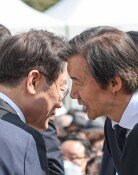Chinese female scientist as Nobel laureate
Chinese female scientist as Nobel laureate
Posted October. 07, 2015 08:34,
Tu Youyou, one of a trio of scientists awarded this years Nobel Prize in physiology and medicine, has emerged as a national hero of China. A lifetime researcher at the China Academy of Chinese Medical Sciences, Tu has become the third Nobel laureate from China after Liu Xiaobo (peace prize) in 2010 and Mo Yan (literature) in 2012, but she is the first winner in the science field, which holds special meaning. She is a "scientist with none of three key factors," namely the title of "master scholar" presented to a scientist of highest caliber in China, doctoral degree and experience in overseas study. Even though she discovered artemisinin, best defense against malaria that saves more than 1 million patients, she has not received recognition she deserves because she is a woman and has no doctoral degree.
At the first national health and hygiene meeting in 1950, late Chinese supreme leader Mao Zedong established the principle that "Chinese medicine must combine with Western medicine" as one of the four principles in health. The measure is contrasted with Japans decision to discard traditional medicine when it introduced Western medicine through the Meiji Restoration. At the center of the drive is the China Institute of Chinese Medical Sciences, which was established in 1955. Since then, medicine in China has developed in a unique way in which traditional medicine converged with Western medicine. The institute was promoted to the China Academy of Chinese Medical Sciences in 2005.
Hailing from Zhejiang Province, 85-year-old Tu joined the China Institute of Chinese Medical Sciences in 1955 after graduating from Beijing Medical College of Pharmacy, and has devoted her life to discovering new substances from traditional Chinese natural medicines to this date. The antimalarial, which gave her the Nobel Prize, was first extracted from sweet wormwood, a traditional Chinese herbal medicine, when she was inspired while reading an ancient medical book from 1600 years ago. Her given name "Youyou" derives from "phrases" in the Classic of Poetry, which means "dear feeds on grass in the field, shedding tears, and she has now lived up to this name worldwide. Criticism and distrust in Chinese medicine that it is non-scientific and lacks safety can be significantly addressed as a result of her citation.
Korea, China and Japan took different paths in traditional medicine. Korean medicine established forces and scope of its own independent from Western medicine. The government established the Korea Institute of Oriental Medicine in 1994, which aims to creatively inherit Asian medicine, but the institute has not generated notable outcome in development of new drugs from herbal medicines, and clinical trials. As a country that boasts of Donguibogam (Treasured Mirror of Eastern Medicine) written by legendary royal physician Heo Jun in the early 17th century, Korea envies China for its astonishing accomplishment.
shchung@donga.com







